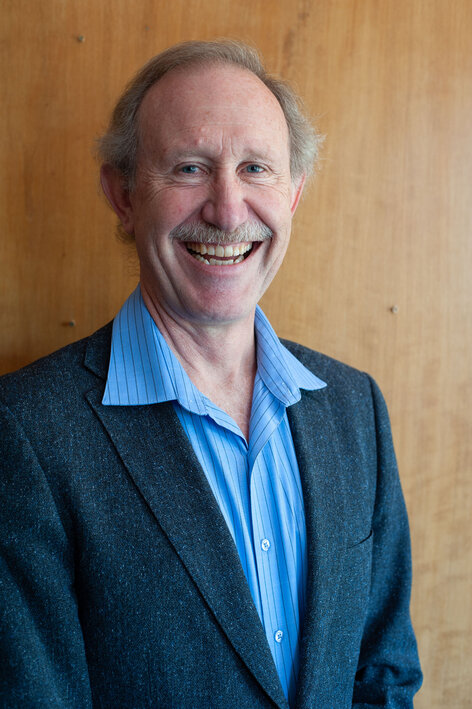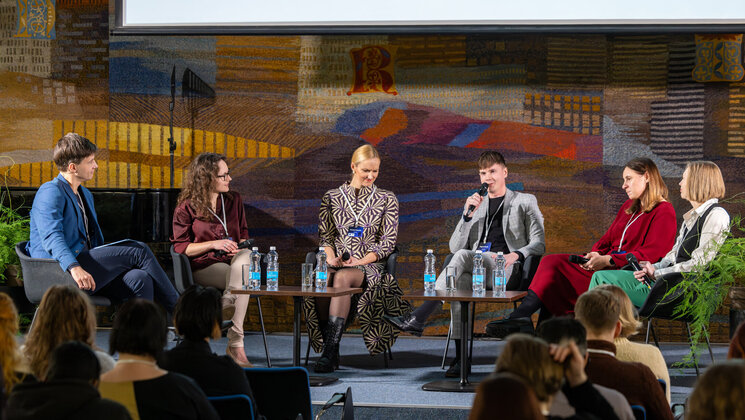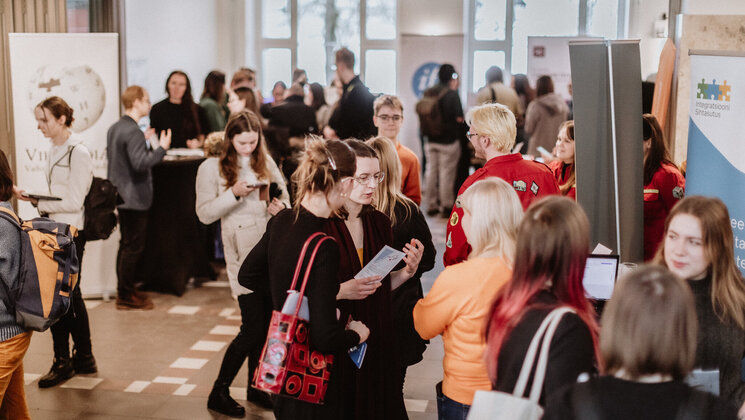-
Faculty of Arts and HumanitiesDean's Office, Faculty of Arts and HumanitiesJakobi 2, r 116-121 51005 Tartu linn, Tartu linn, Tartumaa EST0Institute of History and ArchaeologyJakobi 2 51005 Tartu linn, Tartu linn, Tartumaa EST0Institute of Estonian and General LinguisticsJakobi 2, IV korrus 51005 Tartu linn, Tartu linn, Tartumaa EST0Institute of Philosophy and SemioticsJakobi 2, III korrus, ruumid 302-337 51005 Tartu linn, Tartu linn, Tartumaa EST0Institute of Cultural ResearchÜlikooli 16 51003 Tartu linn, Tartu linn, Tartumaa EST0Institute of Foreign Languages and CulturesLossi 3 51003 Tartu linn, Tartu linn, Tartumaa EST0School of Theology and Religious StudiesÜlikooli 18 50090 Tartu linn, Tartu linn, Tartumaa EST0Viljandi Culture AcademyPosti 1 71004 Viljandi linn, Viljandimaa EST0Professors emeriti, Faculty of Arts and Humanities0Associate Professors emeriti, Faculty of Arts and Humanities0Faculty of Social SciencesDean's Office, Faculty of Social SciencesLossi 36 51003 Tartu linn, Tartu linn, Tartumaa EST0Institute of EducationJakobi 5 51005 Tartu linn, Tartu linn, Tartumaa EST0Johan Skytte Institute of Political StudiesLossi 36, ruum 301 51003 Tartu linn, Tartu linn, Tartumaa EST0School of Economics and Business AdministrationNarva mnt 18 51009 Tartu linn, Tartu linn, Tartumaa EST0Institute of PsychologyNäituse 2 50409 Tartu linn, Tartu linn, Tartumaa EST0School of LawNäituse 20 - 324 50409 Tartu linn, Tartu linn, Tartumaa EST0Institute of Social StudiesLossi 36 51003 Tartu linn, Tartu linn, Tartumaa EST0Narva CollegeRaekoja plats 2 20307 Narva linn, Ida-Virumaa EST0Pärnu CollegeRingi 35 80012 Pärnu linn, Pärnu linn, Pärnumaa EST0Professors emeriti, Faculty of Social Sciences0Associate Professors emeriti, Faculty of Social Sciences0Faculty of MedicineDean's Office, Faculty of MedicineRavila 19 50411 Tartu linn, Tartu linn, Tartumaa ESTInstitute of Biomedicine and Translational MedicineBiomeedikum, Ravila 19 50411 Tartu linn, Tartu linn, Tartumaa ESTInstitute of PharmacyNooruse 1 50411 Tartu linn, Tartu linn, Tartumaa ESTInstitute of DentistryL. Puusepa 1a 50406 Tartu linn, Tartu linn, Tartumaa ESTInstitute of Clinical MedicineL. Puusepa 8 50406 Tartu linn, Tartu linn, Tartumaa ESTInstitute of Family Medicine and Public HealthRavila 19 50411 Tartu linn, Tartu linn, Tartumaa ESTInstitute of Sport Sciences and PhysiotherapyUjula 4 51008 Tartu linn, Tartu linn, Tartumaa ESTProfessors emeriti, Faculty of Medicine0Associate Professors emeriti, Faculty of Medicine0Faculty of Science and TechnologyDean's Office, Faculty of Science and TechnologyVanemuise 46 - 208 51003 Tartu linn, Tartu linn, Tartumaa ESTInstitute of Computer ScienceNarva mnt 18 51009 Tartu linn, Tartu linn, Tartumaa ESTInstitute of GenomicsRiia 23b/2 51010 Tartu linn, Tartu linn, Tartumaa ESTEstonian Marine Institute0Institute of PhysicsInstitute of ChemistryRavila 14a 50411 Tartu linn, Tartu linn, Tartumaa EST0Institute of Mathematics and StatisticsNarva mnt 18 51009 Tartu linn, Tartu linn, Tartumaa EST0Institute of Molecular and Cell BiologyRiia 23, 23b - 134 51010 Tartu linn, Tartu linn, Tartumaa ESTTartu ObservatoryObservatooriumi 1 61602 Tõravere alevik, Nõo vald, Tartumaa EST0Institute of TechnologyNooruse 1 50411 Tartu linn, Tartu linn, Tartumaa ESTInstitute of Ecology and Earth SciencesJ. Liivi tn 2 50409 Tartu linn, Tartu linn, Tartumaa ESTProfessors emeriti, Faculty of Science and Technology0Associate Professors emeriti, Faculty of Science and Technology0Institute of BioengineeringArea of Academic SecretaryHuman Resources OfficeUppsala 6, Lossi 36 51003 Tartu linn, Tartu linn, Tartumaa EST0Area of Head of FinanceFinance Office0Area of Director of AdministrationInformation Technology Office0Administrative OfficeÜlikooli 17 (III korrus) 51005 Tartu linn, Tartu linn, Tartumaa EST0Estates Office0Marketing and Communication OfficeÜlikooli 18, ruumid 102, 104, 209, 210 50090 Tartu linn, Tartu linn, Tartumaa EST0Area of Vice Rector for DevelopmentCentre for Entrepreneurship and InnovationNarva mnt 18 51009 Tartu linn, Tartu linn, Tartumaa EST0University of Tartu Natural History Museum and Botanical GardenVanemuise 46 51003 Tartu linn, Tartu linn, Tartumaa EST0International Cooperation and Protocol Office0University of Tartu MuseumLossi 25 51003 Tartu linn, Tartu linn, Tartumaa EST0Area of RectorRector's Strategy OfficeInternal Audit OfficeArea of Vice Rector for Academic AffairsOffice of Academic AffairsUniversity of Tartu Youth AcademyUppsala 10 51003 Tartu linn, Tartu linn, Tartumaa EST0Student Union OfficeÜlikooli 18b 51005 Tartu linn, Tartu linn, Tartumaa EST0Centre for Learning and TeachingArea of Vice Rector for ResearchUniversity of Tartu LibraryW. Struve 1 50091 Tartu linn, Tartu linn, Tartumaa EST0Grant Office
Guest lecture by Prof Gobus Marais "Co-constructing the Vredefort dome? New materialism, biosemiotics, and epistemic translation"

Semiotics Department warmly invites you on Wednesday, 27 November, at 16:15 to Professor Gobus Marais's guest lecture, "Co-constructing the Vredefort dome? New materialism, biosemiotics, and epistemic translation". The lecture takes place at Jakobi 2-306. Professor Marais is from the Department of Linguistics and Language Practice at the University of the Free State in Bloemfontein, South Africa. This lecture is part of the Jakob von Uexküll lecture series.

The Lecture
If the creation of knowledge is itself a translation process, translation studies scholars need to be able to account for this process and for the translationality (Blumczynski, 2023; Robinson, 2017) that the process entails. In Kant and the platypus, Umberto Eco (1997) provides a fascinating description of the process through which the knowledge about the platypus was constructed by the first groups of Europeans to sail to Australia. Equally, Bruno Latour (1992) has written fascinating texts on the social work performed by mundane artefacts like doors. From a biosemiotic-philosophical perspective, John Deely (2009; 2014) suggests that knowledge is created through an entanglement between reality and organism, and Jakob von Uexküll (1926; 2010) argues for a functional circle through which an organism engages with its environment. The entanglement theme is taken up by new materialists like Karen Barad (2007) to argue for the irreducibility of reality, observation and observer in the knowledge creation process. In translation studies, Robinson (2017) considers the role of the socio-neurology of the brain in the creation of knowledge, and Bennett (2007; 2023) has done foundational work in setting out the parameters of ‘knowledge translation’ or epistemic translation.
In order to delve further into this issue, I start with a description of the history of knowledge creation about the Vredefort Dome, a meteorite impact site in South Africa, using a variety of sources from the field of geology (e.g., Reimold & Gibson, 2005). I then analyse this history from the perspective of knowledge translation, bringing the scholars mentioned above into a dialogue with one another. I pay particular attention to the implications of recent work in ‘new materialism’ with the aim of synthesising the views into something like a ‘constructive realism’ or, as John Deely calls it, a ‘semiotic realism’. This synthesis allows me to consider the role that material reality (including the brain) as well as ideation play in constraining the translation process through which knowledge is created.

References
Barad, K. (2007). Meeting the universe halfway: Quantum physics and the entanglement of matter and meaning. London: Duke University Press.
Bennett, K. (2007). Epistemicide!: The tale of a predatory discourse. The Translator, 13(2), 151-169. doi:10.1080/13556509.2007.10799236
Bennett, K. (2023). Approaches to knowledge translation. In R. Meylaerts, & K. Marais (Eds.), The Routledge Handbook of translation theory and concepts (pp. 443-462). New York: Routledge.
Blumczynski, P. (2023). Experiencing translationality: Material and metaphorical journeys. London: Routledge.
Deely, J. (2009). Purely objective reality. Berlin: De Gruyter/Mouton.
Deely, J. (2014). Semiotic entanglement: The concepts of environment, Umwelt, and Lebenswelt in semiotic perspective. Semiotica, 199, 7-42.
Eco, U. (1997). Kant and the platypus: Essays on language and cognition. London: Harcourt Inc.
Latour, B. 1992. ‘Where are the missing masses?: The sociology of a few mundane artifacts’. In W Bijker and J Law (Eds.). Shaping technology (pp. 225-258). Cambridge, MA: MIT Press.
Reimold, W. U., & Gibson, R. L. (2005). Meteorite impact!: The danger from space and South Africa's mega-impact: The Vredefort Structure. Pretoria: Chris van Rensburg Publications and Council for Geoscience.
Robinson, D. (2017). Translationality: Essays in the translational-medical humanities. London: Routledge.
Von Uexküll, J. (1926). Theoretical biology. London: Kegan Paul, Trensch, Trubner & Co Ltd.
Von Uexküll, J. (2010). A foray into the worlds of animals and humans: With a theory of meaning. (J. D. O'Neil, Trans.) Minneapolis: University of Minnesota Press.
Guest lecture by Prof Gobus Marais "Co-constructing the Vredefort dome? New materialism, biosemiotics, and epistemic translation"
Read more similar news






